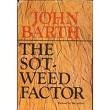The Sot-Weed Factor
So I'm working my way through the PhD reading list...
I spent the past week reading a 750-page historical-fiction work published in 1960 by John Barth titled
The Sot-Weed Factor. Because
Time Magazine included the novel in its 100 Best English-language Novels from 1923 to 2005, I expected an excellent read.
“Sot-weed” is an old term for tobacco, and a “factor” is a middleman who buys for re-sale. The phrase, from which the novel takes its title, is from an actual poem by the same name published in London (1708) and signed Ebenezer Cooke.
The story is set in the 1680s in London and on the east coast of Maryland. Drawing on his mastery of Maryland’s history and the few pieces of actual information available about Cooke and his family, the novelist weaves a story of his protagonist’s adventures on his way to and in Maryland. Along the way Cooke composes his poem, which is originally intended to sing Maryland’s praises, but instead relates Cooke’s disillusionment with the place.
Sadly, the story has entirely too much coincidence, including one character's ability to maintain for months numerous disguises that make him unrecognizable to those closest to him. Then there's the constant inclusion of gross sexual references (think incest, animals, VD, prostitution), which left me with the impression that the author had a scholar’s education with a bawdy school-boy’s fascinations. He also seemed too enamored with his own cleverness and too ready to jar the reader with authorial intrusion. Seven-hundred-plus pages of seventeenth-century English also made for laborious reading.
Henceforth, methinks I shalle be me more skeptical of
Time’s lauding recommendations.
